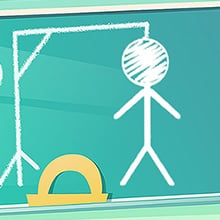
Hangman Games
Discover 2 amazing hangman games. Play for free and have fun!
About Hangman Games
What are Hangman Games?
Hangman is a classic word-guessing game typically played by two or more people. One person thinks of a word, phrase, or sentence, and the other players try to guess it by suggesting letters within a certain number of guesses. The game is named "Hangman" because of the traditional way of keeping track of incorrect guesses: drawing parts of a stick figure hanging from a noose.
How to play Hangman Games?
To play Hangman, start by having one player, known as the host, think of a word or phrase and write down a series of dashes on a piece of paper or a whiteboard, representing each letter in the word or phrase. This word or phrase is kept secret from the other player(s), who will be the "guessers." The host can also draw a simple scaffold to the side, where a stick figure will be drawn as incorrect guesses accumulate.
The guessers then take turns suggesting letters they believe might be in the word or phrase. Each time a guesser proposes a letter, the host checks if it appears in the word or phrase. If the letter is correct, the host fills in the corresponding dashes with the letter. If the letter is incorrect, the host adds a part to the stick figure on the scaffold (typically starting with the head, then the body, arms, and legs).
The game continues with the guessers proposing letters and the host filling in the dashes or adding parts to the stick figure for incorrect guesses. The goal for the guessers is to reveal the entire word or phrase before the stick figure is completely drawn. The host wins if the stick figure is fully drawn before the word or phrase is guessed. Variations of the game might include a set number of incorrect guesses allowed or additional clues given by the host.
Hangman is a simple yet engaging game that helps players improve their vocabulary, spelling, and deductive reasoning skills. It's a versatile game that can be enjoyed in various settings, such as classrooms, family gatherings, or casual get-togethers.
Advantages of Hangman Games
Hangman games offer a range of advantages that make them both educational and enjoyable. One significant benefit is vocabulary building. By playing Hangman, players are exposed to a variety of words, including new and unfamiliar ones. This exposure helps them learn new terms and understand their meanings, which can be especially useful for language learners or young children expanding their vocabulary.
Another advantage of Hangman is the improvement of spelling skills. As players guess letters to form words, they become more familiar with the correct spelling of words. This repeated practice can enhance their ability to spell words accurately, which is a critical skill in writing and communication. Additionally, Hangman helps reinforce letter recognition and the understanding of letter positions within words, which are foundational skills for reading and writing.
Hangman also promotes critical thinking and problem-solving skills. Players must use deductive reasoning to guess the correct letters, especially as the number of incorrect guesses increases. They need to consider letter frequency, common word patterns, and the context of the word or phrase to make educated guesses. This process encourages strategic thinking and improves cognitive abilities. Moreover, Hangman is a fun and engaging way to practice these skills, making it an excellent tool for both educational settings and casual entertainment.


